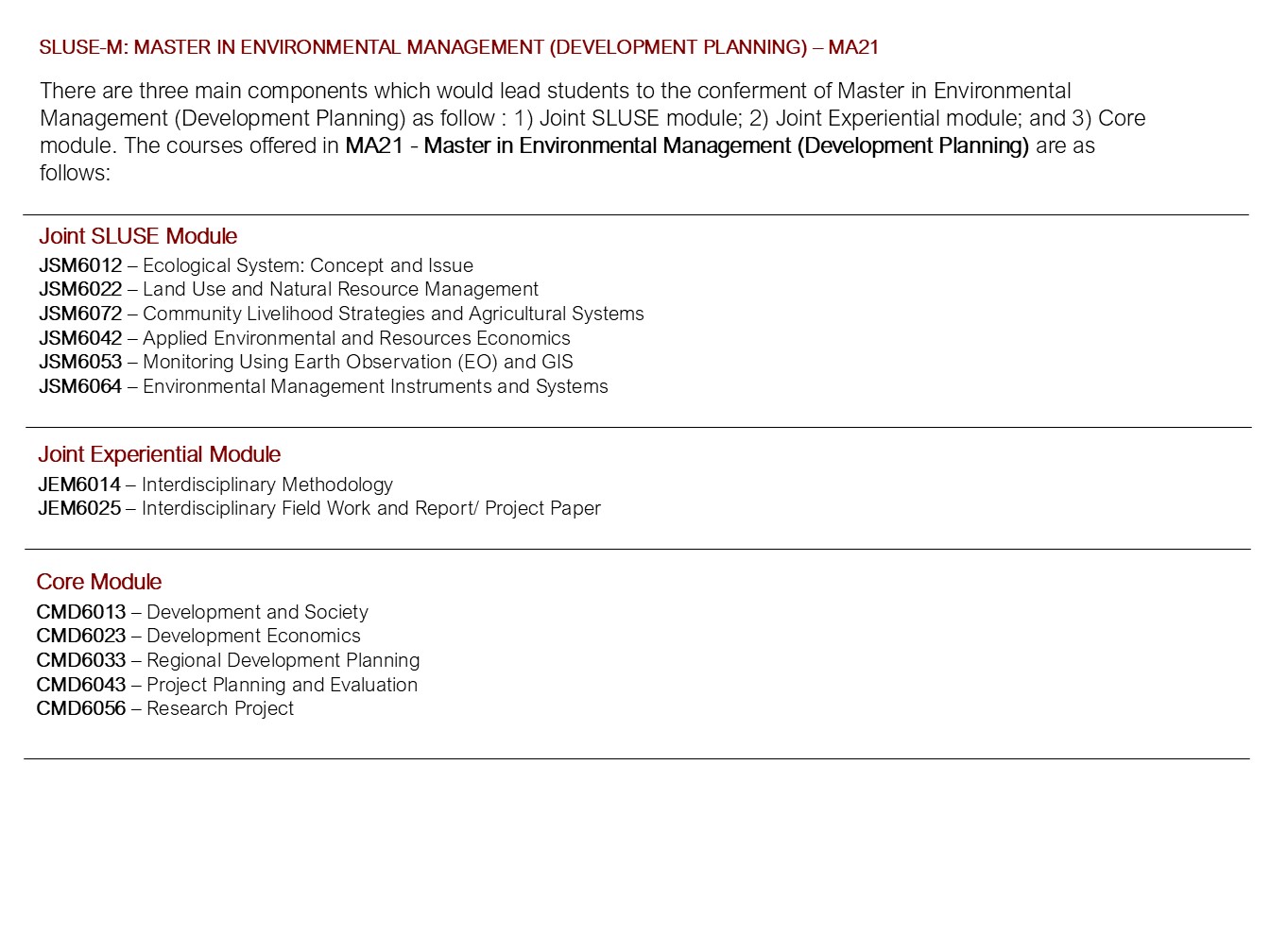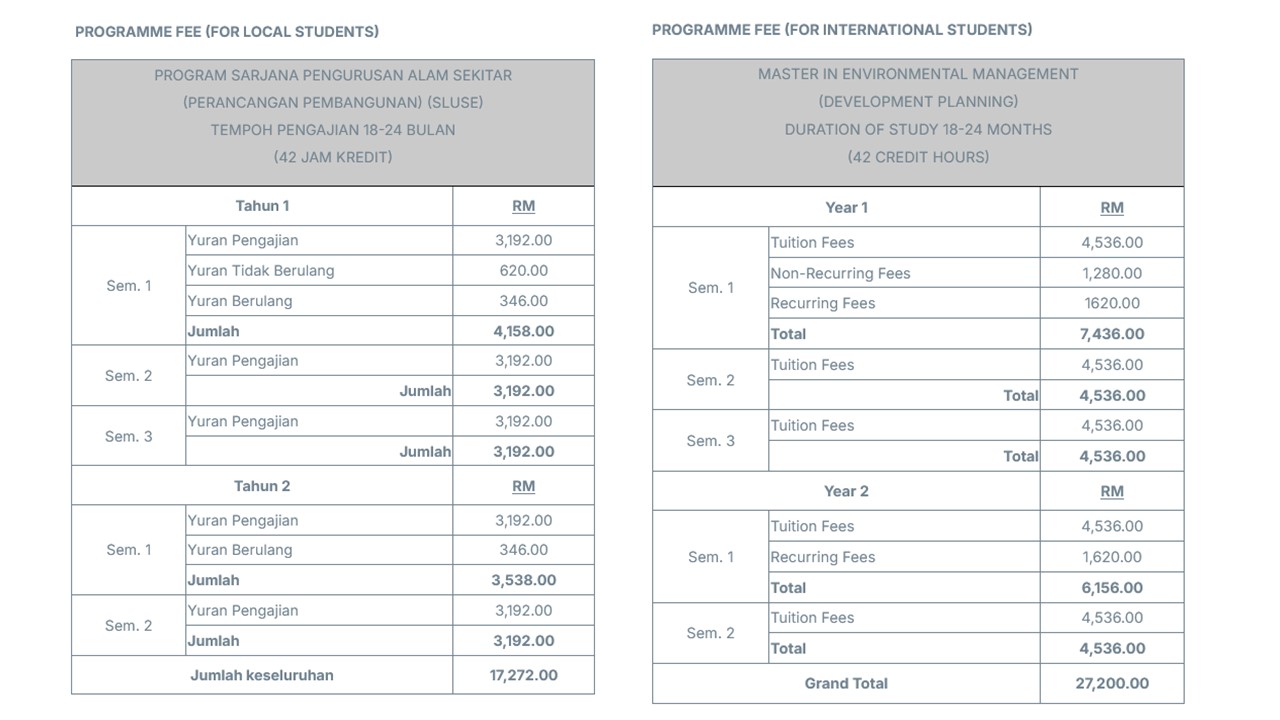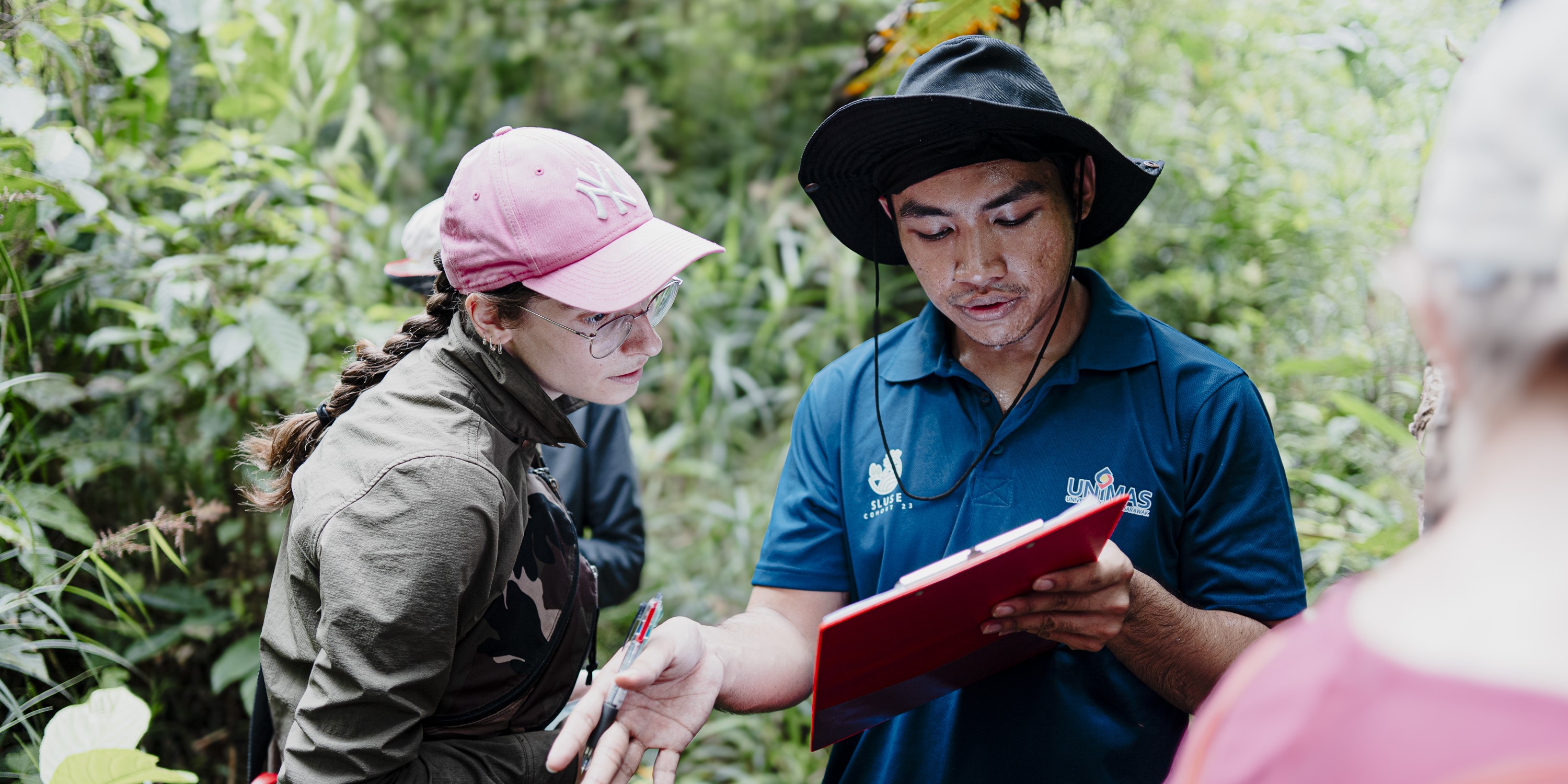
SLUSE-M
Master in Environmental Management (Development Planning)
MA21
Master in Environmental Management (Development Planning) is a Master degree by coursework. It is a master programme offered under Sustainable Land Use and Natural Resource Management in Malaysia (SLUSE-M). The SLUSE-Malaysia (SLUSE-M) Programme is a capacity building academic programme for the promotion of sustainable land use and natural resource management in Malaysia and other developing countries in the region. It is designed for working professionals, consultants as well as graduates and the general public with a relevant bachelor degree who wish to learn or update their knowledge in resource and environmental management. The programme is modelled on and implemented in parallel to a similar programme initiated by a Danish consortium of universities.
This Master in Environmental Management (Development Planning) programme is offered only for September/October intake in Universiti Malaysia Sarawak (UNIMAS). Students are required to successfully complete 42 minimum credits as required by the programme and a final Cumulative Grade Point Average (CGPA) of at least 3.0 in order to graduate.
The Master in Environmental Management (Development Planning) (MEMD) which covers three modules respectively can be completed in a period of 18-24 calendar months. The three modules are as follows:
- Joint SLUSE module;
- Joint Experiential module; and
- Core module.
The SLUSE-M Programme is designed for the following candidates:
- Graduates and professionals involved in resource and environmental management.
- Consultants and policy makers who are presently assigned tasks directly related to resource and environmental conservation with the desire to improve their skills and enhance their knowledge in resource and environmental management.
- The general public with a relevant Bachelor Degree who wish to learn or update their knowledge in resource and environmental management.
The programme shall produce graduates who are:
- Able to integrate knowledge and technical skills by using interdisciplinary approach in sustainable land use and natural resource management.
- Competent leaders and team players in dealing with natural resources and environmental issues.
- Professionals who are able to demonstrate ethical values in employing analytical environmental management tools creatively and innovatively to ensure effective land use and natural resource management.
- Able to demonstrate entrepreneurship skills and recognise the need of lifelong learning, as well as using a broad range of information, media and technology applications for sustainable environmental management.
Upon graduating from this programme, the students are able to:
- Demonstrate mastery of knowledge in environmental management in development planning.
- Evaluate critically and logically by applying integrative knowledge and appropriate skills to solve natural resource, environmental and societal issues and problem.
- Display the technical skills by using interdisciplinary approach in sustainable land use and natural resource management in development planning.
- Possess practical skills of using new environmental tools and instruments, and demonstrate ability to present information to the public and professionals effectively in the field of environmental management in development planning.
- Communicate ideas effectively both in written and oral by using appropriate forms of presentation confidently, accurately and coherently in a well-structured manner to a diverse audience.
- Acquire skills of using a broad range of information, media and technology applications to support environmental studies and/or works.
- Integrate numerical and graphical/visual data for environmental studies and/or works.
- Display good leadership skills, forbearance, creative and credible qualities and necessary skills to work as a team within a society in dealing with planning and execution of environmental management issues.
- Exhibit ability of integrating complex information related to natural resource and the environment and possess an inquisitorial stance towards lifelong learning.
- Demonstrate entrepreneurial competency by initiating projects at local/national level by taking into account environmental and socioeconomic values.
- Exhibit responsibility in conducting a given task and possess high discipline, ethic, moral and professionalism values in environmental management in development planning.
Graduates of the Master in Environmental Management (Development Planning) program at UNIMAS can pursue diverse career opportunities, such as:
- Environmental consultants and planners.
- Sustainable development advisors for governmental and non-governmental organizations.
- Project managers in environmental conservation and management projects.
- Policy analysts specializing in sustainable land use and resource management.
- Academics and researchers in environmental sciences and development planning.
JSM6012 Ecological System
The course introduces the basic environmental issues facing the modern world. Recalling past international commitments to address environmental problems, the "unfinished" agenda is also addressed. The course also discusses the basic principles in ecology, ecological systems and functions with the emphasis of human intervention. Natural ecosystem is discussed in relation to "disturbed" ecosystem both in its contents and functions. The artificial ecosystem, mainly agro-ecosystems, is discussed at length to ensure sufficient understanding of its functions, capabilities and limitations in performing its role in maintaining the expected functions.
JSM6022 Land Use And Natural Resource Management
This course introduces various types of land uses and the current land use practices. The critical concepts of sustainability in land use and natural resource management are also discussed. In addition, the implications or consequences of unsustainable land use and natural resource exploitation that leads to environmental degradation and the idea of carrying capacity are narrated. The concepts of sustainable land use planning and urban development are discussed through various case studies.
JSM6072 Community Livelihood Strategies And Agricultural System
This course discusses the impact of environmental change on community livelihood strategies. The focus is particularly on the rural communities whose economic lives are dependent on agriculture. For this reason, embedded in the learning units are four categories of capital, namely social, financial, human and physical, used to frame the sustainability of the communities' livelihood strategies. The course also examines the livelihood strategies adopted by the local communities amidst social and economic transformation in their community. It examines the income diversification processes such as the changing types of income-generating activities within the community, the changing gender roles in the face of diversification processes, and the overall changing community structure in adapting to this diversification. It also discusses the transformation of economic production in the rural areas such as the issues relating to shifting cultivation, big-scale agriculture schemes, application of poverty alleviation policies and practices, and community-based natural resource management. As such, the course analyzes the relationship between community and exogenous groups in adapting to the different livelihood strategies and its ramifications in altering the natural environment.
JSM6042 Applied Environmental And Resource Economics
This course is intended to provide students with a sound knowledge of environmental management and resource economics in the Third World. The course will cover three components which are concepts in the environmental management and resource economics, environmental economics and resource management. Topics covered are: market failures, renewable and non-renewable resources; state, market and society; poverty, environment and development; patterns of growth and environmental pressure; and tools in renewal resource management, air and water pollution and valuation, regulatory instruments, forest management and timber rents, and natural resource accounting.
JSM6053 Monitoring Using Eart Observation (EO) and Geographical Information System (GIS)
The course discusses topics on the principles and operations of Earth Observation (EO) and GIS, aerial photography and its applications, remote sensing, understanding and interpretation of satellite image, mapping and survey by using GPS. In addition, students will conduct case studies and practical work in the laboratory on a given topic about EO and GIS application for environmental monitoring.
JSM6064 Environmental Management Instruments and Systems
The course is aimed to provide overall understanding on various international or national environmental policies or acts such as the Earth Summit, Kyoto Protocol, National Policy on the Environment, Environmental Quality Act, The Natural Resources and Environmental Ordinance and several other regulations/ orders which are related to environmental policy. In addition, topics on environmental management tools such as Environmental Management System (EMS) and Environmental Impact Assessment (EIA) will be discussed.
JEM6014 Interdisciplinary Methodology
This interdisciplinary research methods course incorporates both the science and social science research approaches. The course emphasizes on three main components: (1) statistical methods and modelling, (2) social research, and (3) scientific research, which requires students to apply the various concepts and techniques in a multidisciplinary research methods.
JEM6025 Interdisciplinary Field Work and Report
This course introduces interdisciplinary field work where the students are given opportunity to apply their interdisciplinary knowledge in research methodologies. The interdisciplinary field work is conducted for a duration of 14 days (2 weeks) and students will be divided in groups and placed at various locations. A specific topic will be assigned to each group and the students are expected to carry out studies which encompass all disciplines. During the field work, the students will be supervised by resource persons of various field of expertise. At the end of the course, the students are expected to present their findings and submit a comprehensive report on their interdisciplinary findings for evaluation.
CMD6013 Development And Society
This course discusses different theories of development, examines concepts of development and underdevelopment from a historical perspective. The political economy of development and the role of the state in development policy formulation and programmes implementation will be examined. The transformative process of development and its impact on various communities, gender relations, resource sustainability and the environment will also be discussed. Community development from a people-centred perspective which addresses issues of poverty and marginalization will be the focus of the course.
CMD6023 Development Economics
This course is intended to provide students with knowledge of development economics in the Third World. The course will cover three components which are economic growth theories, factors for economic growth, and trade and policy issues in development. Topics covered in economic growth are modern growth models, recent neoclassical growth theory and endogenous growth model whereas factors for growth that would be discussed include human capital, non-human capital and technology. In the trade and policy issues in development component, students will be exposed to trade and policies as well as global financial issues. Some sub-topics covered are historical perspective on international trade, role of international trade in development, role of agriculture vs industry in poverty issues, international financial agencies (IMF,ADB) and economic crisis, and fiscal policies in national development.
CMD6033 Regional Development Planning
This course addresses theories and contemporary issues with respect to regional planning and developed a foundation in theory and methods of analysing urban and regional transformation. It draws on political economy, institutional economics and regional science, as well as on politics and sociology. The discussion will encompass labour markets, migration, trade and investment and restructuring shape patterns of local and regional development as well as the institutional cultural dimensions of regional change. Finally, students will evaluate the various approaches to regional development in selected countries.
CMD6043 Project Planning And Evaluation
This course provides students with comprehensive understanding of project planning and practical programme evaluation covering the broad concepts and theory of successful planning, organization, implementation and evaluation of public and private projects (including non-profit) organizations. It focuses on issues arising from the planning and evaluation of projects and gives special attention to their effects on social welfare as well as inter-generational impacts. It uses investment and financial appraisals and social cost-benefit ratio in its analysis but is inclusive of all intangibles (time, recreation, travel and human life) and all disadvantaged stakeholders.
CMD6056 Research Project
This course is designed as a partial requirement for the conferment of a Master of Environmental Management (Development Planning). This course allows the students to conduct an independent research projects based on their chosen topic within the scope of environmental management. The students will be exposed to the real research practices in which they need to apply all the relevant theories, concepts and research methodologies that have been studied in other courses in the program to carry out a research project. The students will be guided by a supervisor in the relevant discipline. Students are required to produce a final output of the research project in the form of a report at the end of the research.
Below is the fee to complete the Master in Environmental Management (Development Planning) in the stipulated time period in 18-24 calendar months :
Malaysian student RM 17,272.00
International student RM 27,200.00
Fees include registration, tuition and course materials for the duration of the programme. Further payment will be required if the students extend their studies beyond 24 months. Details of the fee can be accessed at
*Personal Bond (1st registration) - Subject to the Student's Home Country Rate
*Health Insurance - RM 575.00/year
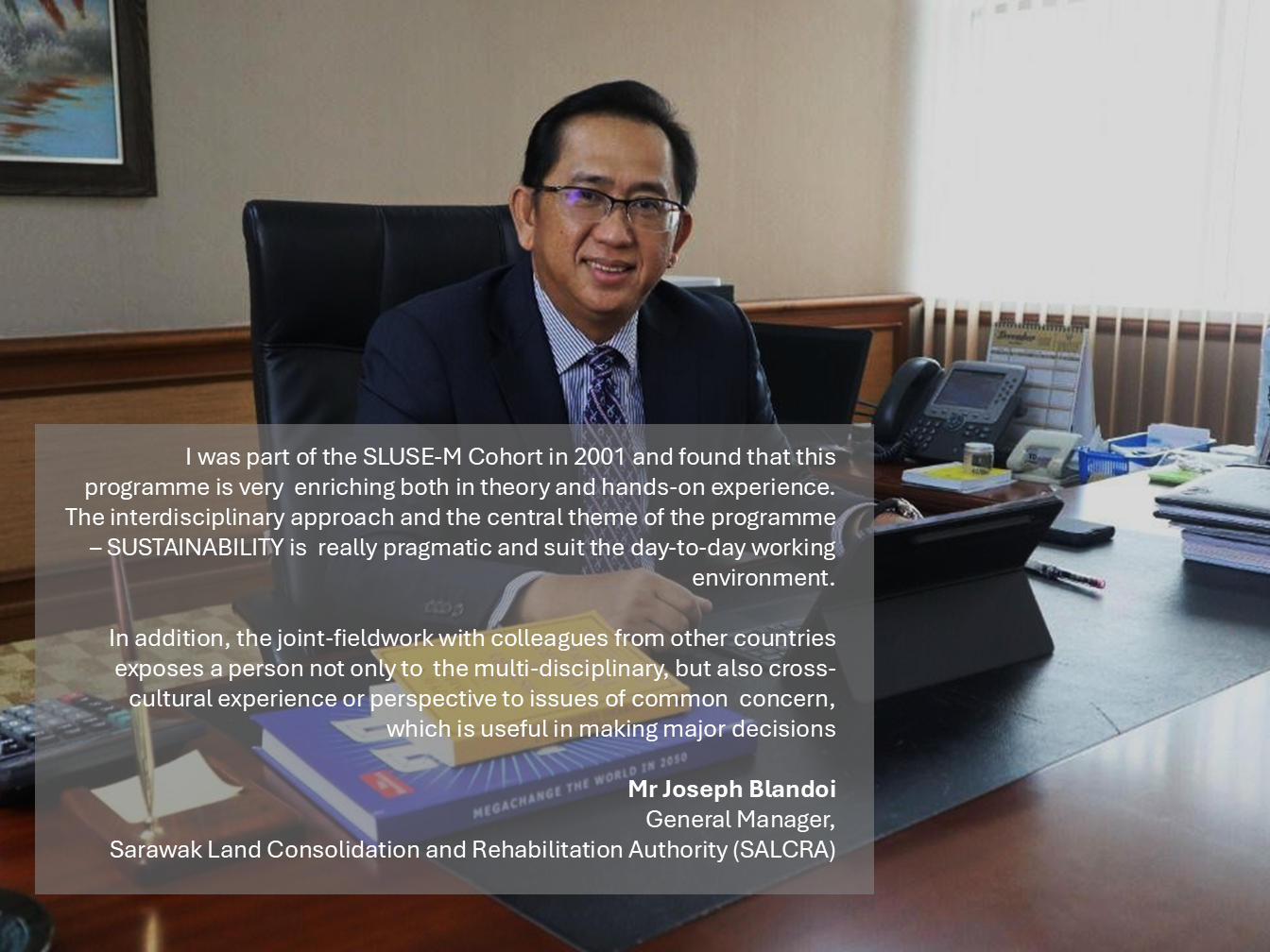
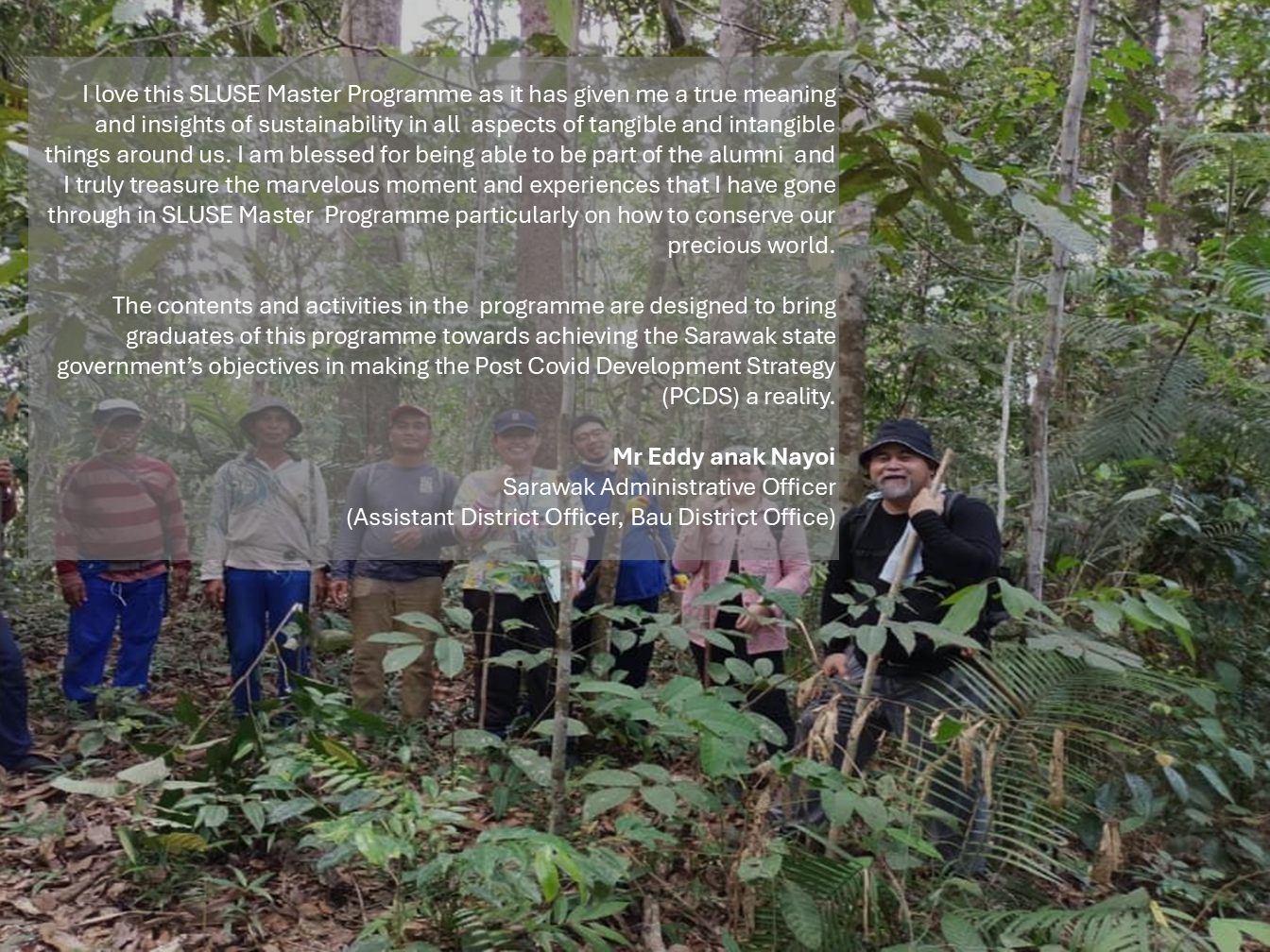
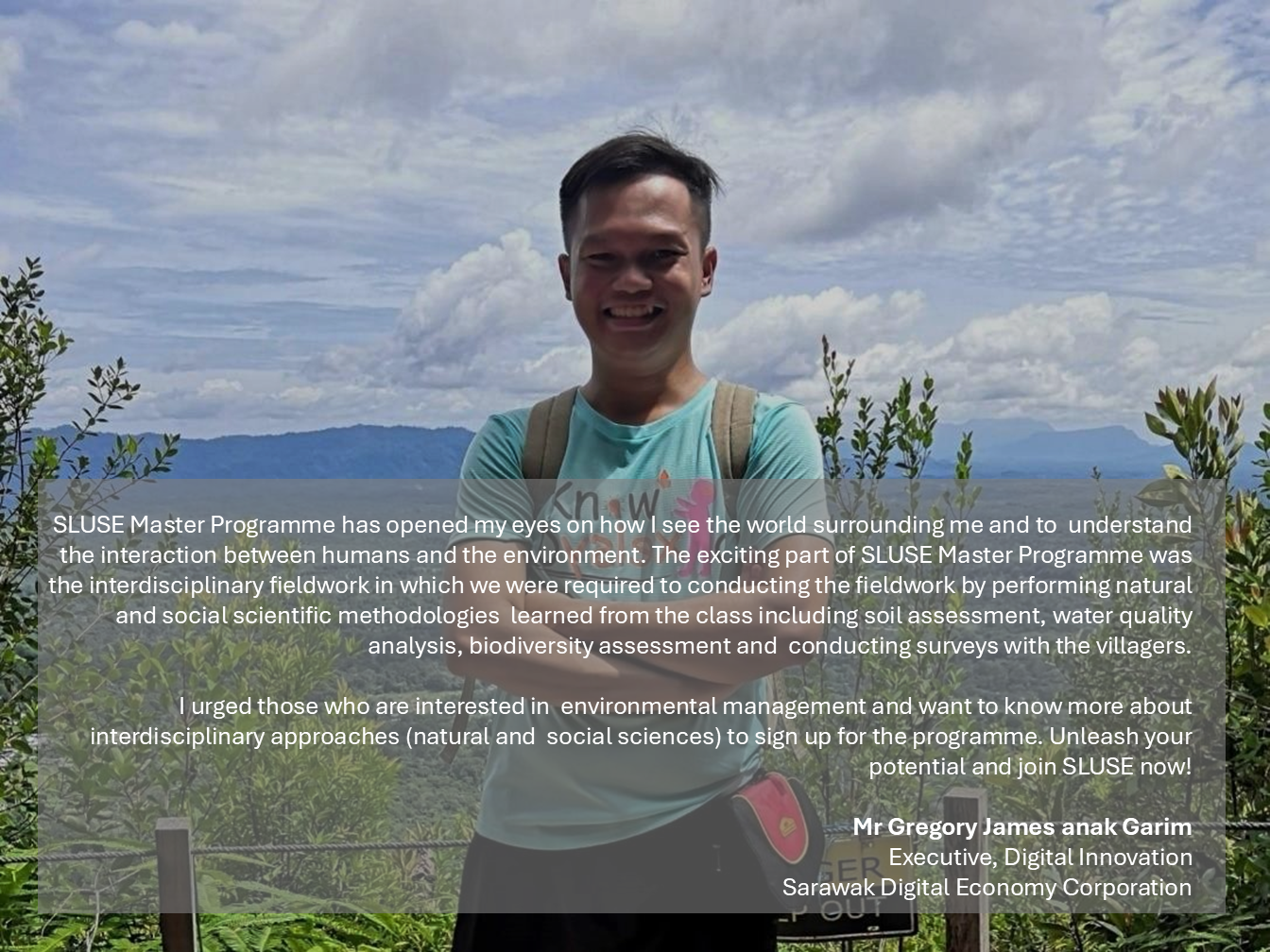
ENTRY REQUIREMENTS (AS APPROVED BY SENATE NOS. 04/2020 -189)
- A Bachelor degree with a minimum CGPA of 2.50 or equivalent, as accepted by the Senate;
- A Bachelor degree or equivalent but with CGPA less than 2.50, may be admitted subject to a minimum of 5 years working experience in the relevant field; or
- Other equivalent qualifications approved by the Senate
- For international students, a minimum IELTS Score of 5.0 or its equivalent ( e.g TOEFL-525; TOEFL Computer Test -196; TOEFL Internet Test 69-70 or MUET Band 3) is required.
For more info, visit https://www.unimas.my/sluse-m .
Associate Prof. Dr Wong Swee Kiong
Programme Coordinator
Faculty of Social Sciences and Humanities
Universiti Malaysia Sarawak (UNIMAS)
94300 Kota Samarahan
Sarawak, Malaysia
Tel: +6082592761
Fax:+6082584145
swkwong@unimas.my

